(新课标)Unit 1 Where did you go on vacationSection A (Grammar Focus 3c)同步课件(共29张PPT)
文档属性
| 名称 | (新课标)Unit 1 Where did you go on vacationSection A (Grammar Focus 3c)同步课件(共29张PPT) | 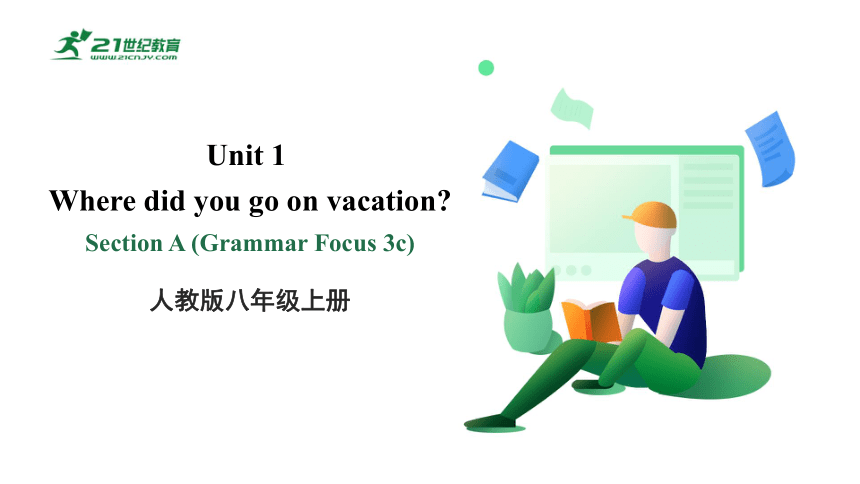 | |
| 格式 | pptx | ||
| 文件大小 | 10.7MB | ||
| 资源类型 | 试卷 | ||
| 版本资源 | 人教新目标(Go for it)版 | ||
| 科目 | 英语 | ||
| 更新时间 | 2022-08-04 06:37:01 | ||
图片预览

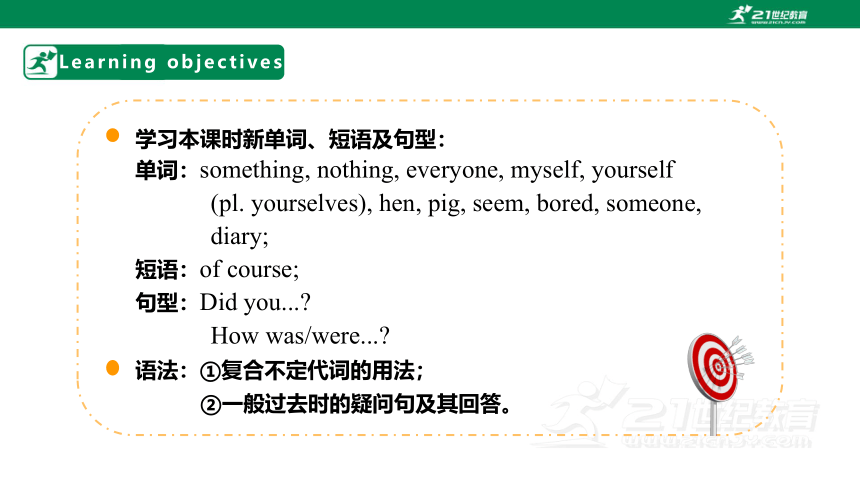
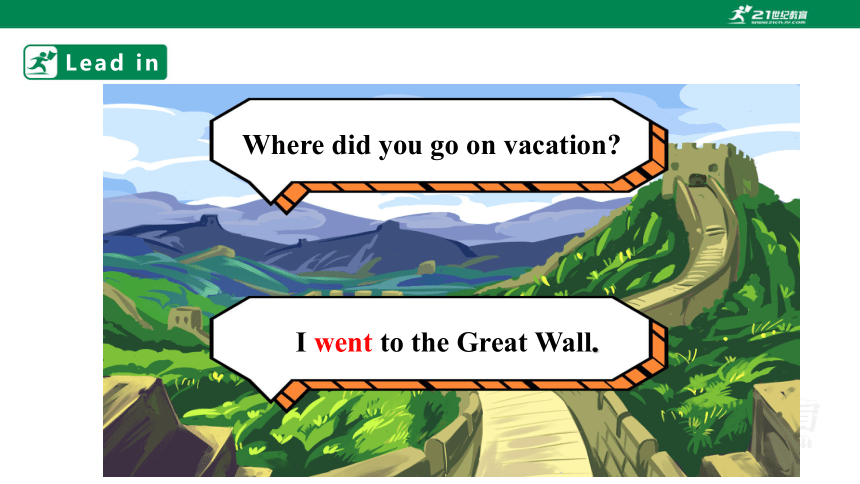
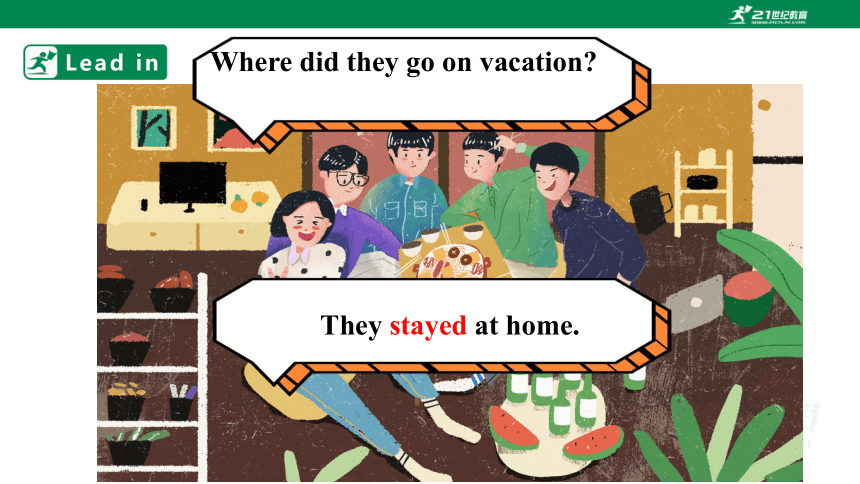
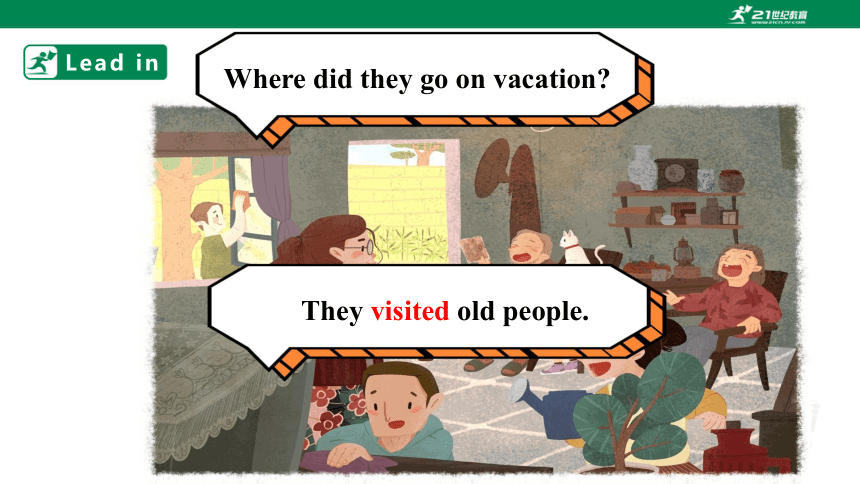
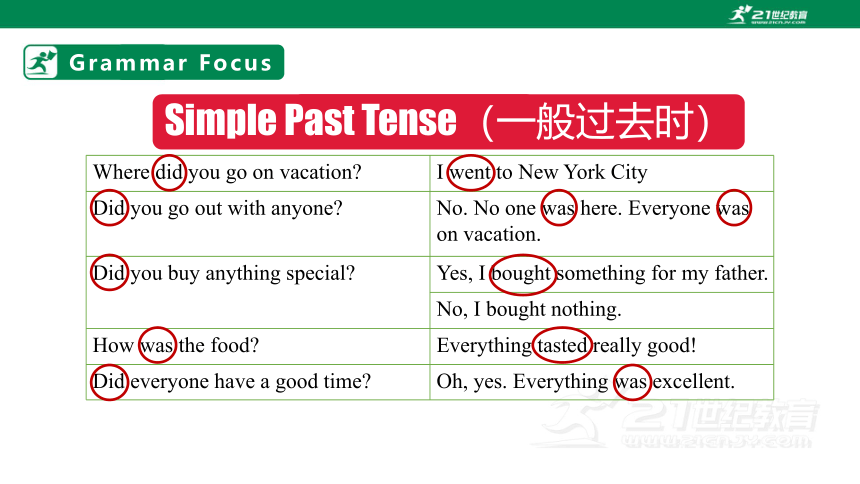
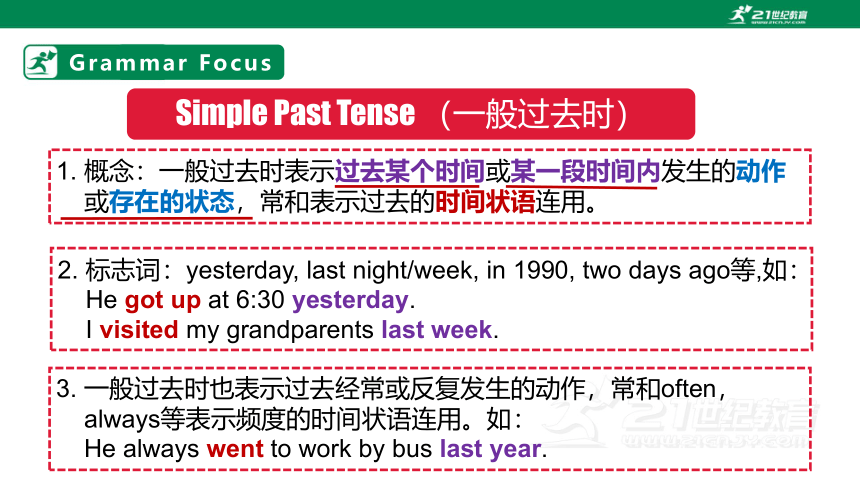
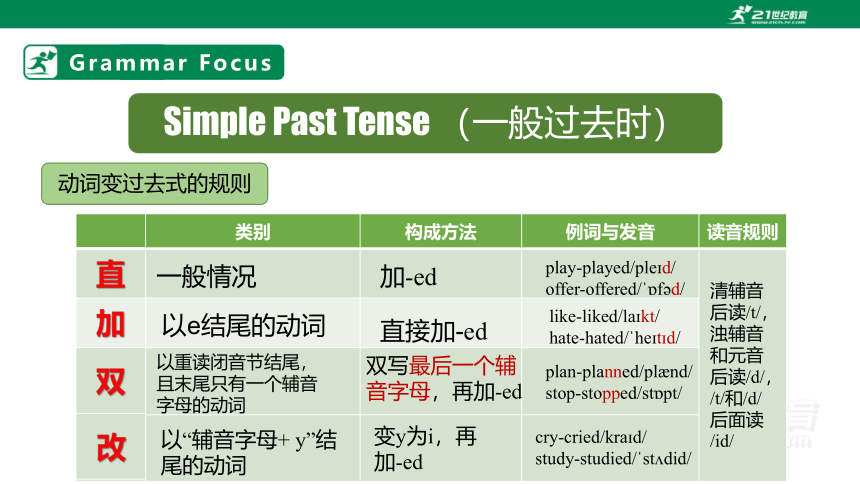
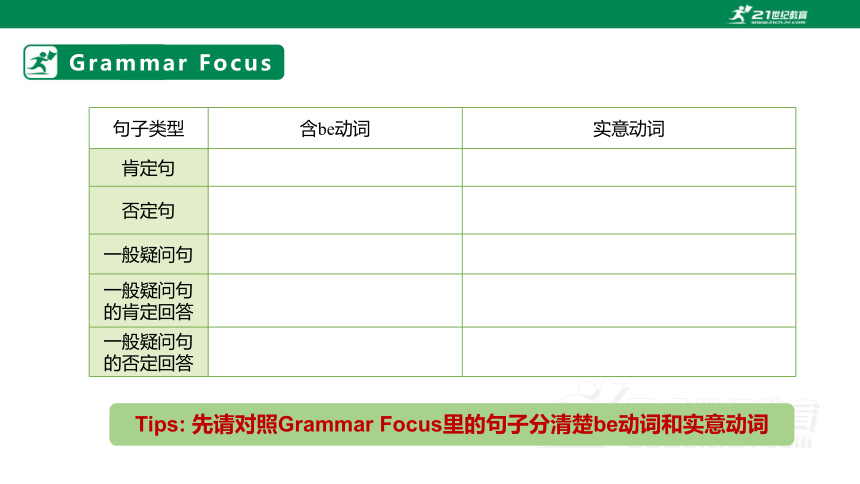
文档简介
(共29张PPT)
Unit 1
Where did you go on vacation
Section A (Grammar Focus 3c)
人教版八年级上册
Learning objectives
学习本课时新单词、短语及句型:
单词:something, nothing, everyone, myself, yourself
(pl. yourselves), hen, pig, seem, bored, someone,
diary;
短语:of course;
句型:Did you...
How was/were...
语法:①复合不定代词的用法;
②一般过去时的疑问句及其回答。
Lead in
Where did you go on vacation
I went to the Great Wall.
Lead in
Where did they go on vacation
They stayed at home.
Lead in
Where did they go on vacation
They visited old people.
Grammar Focus
Where did you go on vacation I went to New York City
Did you go out with anyone No. No one was here. Everyone was on vacation.
Did you buy anything special Yes, I bought something for my father.
No, I bought nothing.
How was the food Everything tasted really good!
Did everyone have a good time Oh, yes. Everything was excellent.
Grammar Focus
Simple Past Tense(一般过去时)
Grammar Focus
Simple Past Tense (一般过去时)
1. 概念:一般过去时表示过去某个时间或某一段时间内发生的动作
或存在的状态,常和表示过去的时间状语连用。
2. 标志词:yesterday, last night/week, in 1990, two days ago等,如:
He got up at 6:30 yesterday.
I visited my grandparents last week.
3. 一般过去时也表示过去经常或反复发生的动作,常和often,
always等表示频度的时间状语连用。如:
He always went to work by bus last year.
Grammar Focus
Simple Past Tense (一般过去时)
动词变过去式的规则
类别 构成方法 例词与发音 读音规则
一般情况
play-played/ple d/
offer-offered/ f d/
加-ed
以e结尾的动词
直接加-ed
like-liked/la kt/
hate-hated/ he t d/
以重读闭音节结尾,
且末尾只有一个辅音
字母的动词
plan-planned/pl nd/
stop-stopped/st pt/
双写最后一个辅
音字母,再加-ed
cry-cried/kra d/
study-studied/ st did/
以“辅音字母+ y”结
尾的动词
变y为i,再
加-ed
清辅音后读/t/,浊辅音和元音后读/d/,/t/和/d/后面读/id/
直
加
双
改
Grammar Focus
句子类型 含be动词 实意动词
肯定句
否定句
一般疑问句
一般疑问句的肯定回答
一般疑问句的否定回答
Tips: 先请对照Grammar Focus里的句子分清楚be动词和实意动词
Grammar Focus
句子类型 含be动词 实意动词
肯定句 主语 + was/were + 其他. 主语 + 动词过去式 + 其他.
否定句 主语 + was/were + not + 其他. 主语 + didn’t + 动词原形 + 其他.
一般疑问句 Was/Were + 主语+其他 Did + 主语 + 动词原形 + 其他
一般疑问句的肯定回答 Yes, 主语 + was/were. Yes, 主语 + did.
一般疑问句的否定回答 No, 主语 + wasn’t/weren’t. No, 主语 + didn’t.
Grammar Focus
句子类型 含be动词 实意动词
肯定句
否定句
一般疑问句
一般疑问句的肯定回答
一般疑问句的否定回答
他昨天在家。
Have a try
He was at home yesterday.
He wasn't at home yesterday.
Was he at home yesterday
Yes, he was.
No, he was not(wasn't).
她上周去了北京。
She went to Beijing last week.
She didn't go to Beijing last week.
Did she go to Beijing last week
Yes, she did.
No, she didn't.
be动词在一般现在时中有am,is,are三种形式,意为“是”,但在一般过去时中有was(单数)和were(复数).
实意动词(行为动词)按照动词过去时变化规则进行变化,但在一般疑问句中需用助动词did,后接动词原形。
Exercise
1. I ________ an old friend when I ________ in the street last Wednesday.
A、met, walk B、met, was walking
C、was meeting, walked D、was meeting, was walking
2. We _______ the Great Wall three days ago.
A、didn't went to B、didn't go to C、weren't go to D、go to
3. — Where ______ you ______ on vacation
— I went to New York City.
A、did, go B、are, going C、will, go D、do, you
4. —What______in the office just now
—Oh, Dale lost his watch.
A、happens B、happened C、is happening D、happen
5. —Can I use your pen, Mike
—Sorry. I______to bring it here this morning.
A、forget B、forgot C、am forgetting D、will forget
Grammar Focus
Where did you go on vacation I went to New York City
Did you go out with anyone No. No one was here. Everyone was on vacation.
Did you buy anything special Yes, I bought something for my father.
No, I bought nothing.
How was the food Everything tasted really good!
Did everyone have a good time Oh, yes. Everything was excellent.
Grammar Focus
Compound Indefinite Pronouns
复合不定代词
Grammar Focus
复合不定代词
somebody 某人 anybody 任何人 nobody 没有人 everybody
每人/大家
someone 某人 anyone 任何人 no one 没有人 everyone
每人/大家
something 某个东西/事 anything 任何东西/事 nothing 没有东西/事 everything
每一个东西/事情
Grammar Focus
不定代词 + adj. / else
Xiao Ming, he has something important to tell you.
不定代词必须放在adj.和else前
something, someone等:肯定句
anything, anyone等:否定句、疑问句
Can you find anyone else
不定代词做主语,谓语动词用单三形式
Everything is possible!
Grammar Focus
①something可用于疑问句中,表示请求、建议或征求意见的疑问句。
*Would you like something to drink
你想喝点东西吗
②anything可以用于肯定句, 表示“任何事物”。
*Just ring if you need anything.
如果需要什么东西, 你就按铃。
Tips
Exercise
Last week, I went ________ and I took lots of photos.
A. interesting somewhere B. somewhere interesting
C. interesting anywhere D. anywhere interesting
2. Did you go ____?
A.warm somewhere B. anywhere warm
C. warm anywhere D. somewhere warm
3. I can’t find my pen ________.
A. somewhere B. nowhere C. anywhere D. everywhere
4. ---Why do you come here
--- Because I have ____ to tell you.
A. anything important B. important anything
C. something important D. important something
Work on 3a
anyone
something
anything
everything
nothing
Linda: Did you do _________ fun on your vacation, Alice
Alice: Yes, I did. I went to Sanya.
Linda: How did you like it
Alice: Well, it was my first time there, so_________ was really interesting.
Linda: Did you do with ________
Alice: Yes, I did. I went with my sister.
Linda: Did you go shopping
Alice: Of course! I bought __________ for my parents, but _________ for myself.
Linda: Why didn’t you buy _________ for yourself
Alice: I didn’t really see__________ I liked.
anything
everything
anyone
something
nothing
anything
anything
Fill in the blanks with the words in the box and practice the conversation.
当然;自然。
Of course not. 当然不。
反身代词,我自己
反身代词,你自己
1.How did you like it?
=What do you think of it
你觉得它怎么样?
Work on 3b
Dear Bill,
How was your vacation Did you do ______ interesting Did ______ in the family go with you I went to a friend’s farm in the countryside with my family. ________ was great. We fed some hens and saw some baby pigs. They were so cute! The only problem was that there was _______much to do in the evening but read. Still ______ seemed to be bored. Bye for now!
Mark
anything everything nothing everyone no one
anything
anyone
Everything
nothing
no one
Fill in the blanks in the email message with the words in the box.
Language points
... nothing but to do sth. 某人除了某事之外什么也没...。
此处的but表示“除了”,前有实义动词do时but后的不定式需省略to
Eg: I do nothing but play with the phone.
我除了玩手机什么也没干。
Eg: My teacher tells me nothing but to come on.
我的老师除了对我说加油,其他什么都没说。
1. ...there was nothing much to do in the evening but read.
Language points
seem[si m] v.好像;似乎;看来, 常见搭配有:
(1) 主语+seem+形容词 ... 看起来好像
Eg: She seemed sad.
(2) seem to do sth 似乎要做某事
Eg: She seemed to be sad.
(3) It seems that+从句 似乎...
Eg: It seemed that she was sad.
2. Still no one seemed to be bore.
Language points
我发现这个故事太无聊了。
I find the story very ________.
我对他说的话厌烦极了。
I’m ______ with what he said.
bored “厌烦的;感到无聊的”,修饰人,作表语。
boring “无聊的;令人厌烦的”,修饰事或物,
可作表语和定语。
bored
boring
辨析:bored 与 boring
Work on 3c
Ask your group questions about their last vacation. Then tell the class your results.
Did you… Everyone Someone(write the classmate’s name) No one
eat anything at a restaurant
read anything interesting
visit anyone in your family
buy anything?
keep a diary
In our group, everyone ate something at a restaurant…
Work on 3c
This summer, I went to_______with my friends on my vacation. It was_______ in _____.
We went to _______ and it was beautiful.We also visited _______ I liked this place because I learned something important. _______ were really friendly and they helped us a lot. We ate _______. Food in _____ was delicious.
All in all, it was a/an ________ vacation. You should go there someday.
Show Time
Summary
Summary
一般过去时
概念
标志词
用法
动词变化(be动词和实意动词)
句型变化
复合不定代词
概念
包含有什么
用法
常见考点
somebodyV.S. anybody
everyoneV.S. every one
定语后置
Homework
1. 完成课本3c的内容;
2. 完成练习册。
Reflection
本课通过学生感兴趣的话题交流导入新课,然后利用Grammar Focus的句子回顾一般过去时的用法,接着引入复合不定代词这部分新知,并通过练习加深学生的理解和记忆。
谢谢
21世纪教育网(www.21cnjy.com)
中小学教育资源网站
兼职招聘:
https://www.21cnjy.com/recruitment/home/admin
Unit 1
Where did you go on vacation
Section A (Grammar Focus 3c)
人教版八年级上册
Learning objectives
学习本课时新单词、短语及句型:
单词:something, nothing, everyone, myself, yourself
(pl. yourselves), hen, pig, seem, bored, someone,
diary;
短语:of course;
句型:Did you...
How was/were...
语法:①复合不定代词的用法;
②一般过去时的疑问句及其回答。
Lead in
Where did you go on vacation
I went to the Great Wall.
Lead in
Where did they go on vacation
They stayed at home.
Lead in
Where did they go on vacation
They visited old people.
Grammar Focus
Where did you go on vacation I went to New York City
Did you go out with anyone No. No one was here. Everyone was on vacation.
Did you buy anything special Yes, I bought something for my father.
No, I bought nothing.
How was the food Everything tasted really good!
Did everyone have a good time Oh, yes. Everything was excellent.
Grammar Focus
Simple Past Tense(一般过去时)
Grammar Focus
Simple Past Tense (一般过去时)
1. 概念:一般过去时表示过去某个时间或某一段时间内发生的动作
或存在的状态,常和表示过去的时间状语连用。
2. 标志词:yesterday, last night/week, in 1990, two days ago等,如:
He got up at 6:30 yesterday.
I visited my grandparents last week.
3. 一般过去时也表示过去经常或反复发生的动作,常和often,
always等表示频度的时间状语连用。如:
He always went to work by bus last year.
Grammar Focus
Simple Past Tense (一般过去时)
动词变过去式的规则
类别 构成方法 例词与发音 读音规则
一般情况
play-played/ple d/
offer-offered/ f d/
加-ed
以e结尾的动词
直接加-ed
like-liked/la kt/
hate-hated/ he t d/
以重读闭音节结尾,
且末尾只有一个辅音
字母的动词
plan-planned/pl nd/
stop-stopped/st pt/
双写最后一个辅
音字母,再加-ed
cry-cried/kra d/
study-studied/ st did/
以“辅音字母+ y”结
尾的动词
变y为i,再
加-ed
清辅音后读/t/,浊辅音和元音后读/d/,/t/和/d/后面读/id/
直
加
双
改
Grammar Focus
句子类型 含be动词 实意动词
肯定句
否定句
一般疑问句
一般疑问句的肯定回答
一般疑问句的否定回答
Tips: 先请对照Grammar Focus里的句子分清楚be动词和实意动词
Grammar Focus
句子类型 含be动词 实意动词
肯定句 主语 + was/were + 其他. 主语 + 动词过去式 + 其他.
否定句 主语 + was/were + not + 其他. 主语 + didn’t + 动词原形 + 其他.
一般疑问句 Was/Were + 主语+其他 Did + 主语 + 动词原形 + 其他
一般疑问句的肯定回答 Yes, 主语 + was/were. Yes, 主语 + did.
一般疑问句的否定回答 No, 主语 + wasn’t/weren’t. No, 主语 + didn’t.
Grammar Focus
句子类型 含be动词 实意动词
肯定句
否定句
一般疑问句
一般疑问句的肯定回答
一般疑问句的否定回答
他昨天在家。
Have a try
He was at home yesterday.
He wasn't at home yesterday.
Was he at home yesterday
Yes, he was.
No, he was not(wasn't).
她上周去了北京。
She went to Beijing last week.
She didn't go to Beijing last week.
Did she go to Beijing last week
Yes, she did.
No, she didn't.
be动词在一般现在时中有am,is,are三种形式,意为“是”,但在一般过去时中有was(单数)和were(复数).
实意动词(行为动词)按照动词过去时变化规则进行变化,但在一般疑问句中需用助动词did,后接动词原形。
Exercise
1. I ________ an old friend when I ________ in the street last Wednesday.
A、met, walk B、met, was walking
C、was meeting, walked D、was meeting, was walking
2. We _______ the Great Wall three days ago.
A、didn't went to B、didn't go to C、weren't go to D、go to
3. — Where ______ you ______ on vacation
— I went to New York City.
A、did, go B、are, going C、will, go D、do, you
4. —What______in the office just now
—Oh, Dale lost his watch.
A、happens B、happened C、is happening D、happen
5. —Can I use your pen, Mike
—Sorry. I______to bring it here this morning.
A、forget B、forgot C、am forgetting D、will forget
Grammar Focus
Where did you go on vacation I went to New York City
Did you go out with anyone No. No one was here. Everyone was on vacation.
Did you buy anything special Yes, I bought something for my father.
No, I bought nothing.
How was the food Everything tasted really good!
Did everyone have a good time Oh, yes. Everything was excellent.
Grammar Focus
Compound Indefinite Pronouns
复合不定代词
Grammar Focus
复合不定代词
somebody 某人 anybody 任何人 nobody 没有人 everybody
每人/大家
someone 某人 anyone 任何人 no one 没有人 everyone
每人/大家
something 某个东西/事 anything 任何东西/事 nothing 没有东西/事 everything
每一个东西/事情
Grammar Focus
不定代词 + adj. / else
Xiao Ming, he has something important to tell you.
不定代词必须放在adj.和else前
something, someone等:肯定句
anything, anyone等:否定句、疑问句
Can you find anyone else
不定代词做主语,谓语动词用单三形式
Everything is possible!
Grammar Focus
①something可用于疑问句中,表示请求、建议或征求意见的疑问句。
*Would you like something to drink
你想喝点东西吗
②anything可以用于肯定句, 表示“任何事物”。
*Just ring if you need anything.
如果需要什么东西, 你就按铃。
Tips
Exercise
Last week, I went ________ and I took lots of photos.
A. interesting somewhere B. somewhere interesting
C. interesting anywhere D. anywhere interesting
2. Did you go ____?
A.warm somewhere B. anywhere warm
C. warm anywhere D. somewhere warm
3. I can’t find my pen ________.
A. somewhere B. nowhere C. anywhere D. everywhere
4. ---Why do you come here
--- Because I have ____ to tell you.
A. anything important B. important anything
C. something important D. important something
Work on 3a
anyone
something
anything
everything
nothing
Linda: Did you do _________ fun on your vacation, Alice
Alice: Yes, I did. I went to Sanya.
Linda: How did you like it
Alice: Well, it was my first time there, so_________ was really interesting.
Linda: Did you do with ________
Alice: Yes, I did. I went with my sister.
Linda: Did you go shopping
Alice: Of course! I bought __________ for my parents, but _________ for myself.
Linda: Why didn’t you buy _________ for yourself
Alice: I didn’t really see__________ I liked.
anything
everything
anyone
something
nothing
anything
anything
Fill in the blanks with the words in the box and practice the conversation.
当然;自然。
Of course not. 当然不。
反身代词,我自己
反身代词,你自己
1.How did you like it?
=What do you think of it
你觉得它怎么样?
Work on 3b
Dear Bill,
How was your vacation Did you do ______ interesting Did ______ in the family go with you I went to a friend’s farm in the countryside with my family. ________ was great. We fed some hens and saw some baby pigs. They were so cute! The only problem was that there was _______much to do in the evening but read. Still ______ seemed to be bored. Bye for now!
Mark
anything everything nothing everyone no one
anything
anyone
Everything
nothing
no one
Fill in the blanks in the email message with the words in the box.
Language points
... nothing but to do sth. 某人除了某事之外什么也没...。
此处的but表示“除了”,前有实义动词do时but后的不定式需省略to
Eg: I do nothing but play with the phone.
我除了玩手机什么也没干。
Eg: My teacher tells me nothing but to come on.
我的老师除了对我说加油,其他什么都没说。
1. ...there was nothing much to do in the evening but read.
Language points
seem[si m] v.好像;似乎;看来, 常见搭配有:
(1) 主语+seem+形容词 ... 看起来好像
Eg: She seemed sad.
(2) seem to do sth 似乎要做某事
Eg: She seemed to be sad.
(3) It seems that+从句 似乎...
Eg: It seemed that she was sad.
2. Still no one seemed to be bore.
Language points
我发现这个故事太无聊了。
I find the story very ________.
我对他说的话厌烦极了。
I’m ______ with what he said.
bored “厌烦的;感到无聊的”,修饰人,作表语。
boring “无聊的;令人厌烦的”,修饰事或物,
可作表语和定语。
bored
boring
辨析:bored 与 boring
Work on 3c
Ask your group questions about their last vacation. Then tell the class your results.
Did you… Everyone Someone(write the classmate’s name) No one
eat anything at a restaurant
read anything interesting
visit anyone in your family
buy anything?
keep a diary
In our group, everyone ate something at a restaurant…
Work on 3c
This summer, I went to_______with my friends on my vacation. It was_______ in _____.
We went to _______ and it was beautiful.We also visited _______ I liked this place because I learned something important. _______ were really friendly and they helped us a lot. We ate _______. Food in _____ was delicious.
All in all, it was a/an ________ vacation. You should go there someday.
Show Time
Summary
Summary
一般过去时
概念
标志词
用法
动词变化(be动词和实意动词)
句型变化
复合不定代词
概念
包含有什么
用法
常见考点
somebodyV.S. anybody
everyoneV.S. every one
定语后置
Homework
1. 完成课本3c的内容;
2. 完成练习册。
Reflection
本课通过学生感兴趣的话题交流导入新课,然后利用Grammar Focus的句子回顾一般过去时的用法,接着引入复合不定代词这部分新知,并通过练习加深学生的理解和记忆。
谢谢
21世纪教育网(www.21cnjy.com)
中小学教育资源网站
兼职招聘:
https://www.21cnjy.com/recruitment/home/admin
同课章节目录
- Unit 1 Where did you go on vacation?
- Section A
- Section B
- Unit 2 How often do you exercise?
- Section A
- Section B
- Unit 3 I'm more outgoing than my sister.
- Section A
- Section B
- Unit 4 What's the best movie theater?
- Section A
- Section B
- Unit 5 Do you want to watch a game show?
- Section A
- Section B
- Unit 6 I'm going to study computer science.
- Section A
- Section B
- Unit 7 Will people have robots?
- Section A
- Section B
- Unit 8 How do you make a banana milk shake?
- Section A
- Section B
- Unit 9 Can you come to my party?
- Section A
- Section B
- Unit 10 If you go to the party, you'll have a grea
- Section A
- Section B
